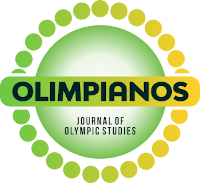Birthplace of Brazilian athletes who competed in Tokyo 2020 and the states variables related to the chances of being a medalist
DOI:
https://doi.org/10.30937/2526-6314.v5.id131Keywords:
athletes, Olympic Games, predictors of performanceAbstract
The purpose of this study was to describe the birthplace of Brazilian Tokyo 2020 Olympic athletes, and to investigate the states-related variables associated with winning an Olympic medal. Data were collected based on the Brazilian Olympic Committee official list of athletes competing at the Tokyo 2020 Olympic Games and from ESTADIC research (2016) and Brazilian Institute of Geography and Statistics (IBGE). Binary Logistic Regression was used with the purpose to estimate the chances of the states have athletes who won an Olympic medal. All the analysis was performed in JAMOVA, considering p<0.05. Sample comprised 303 athletes, from the five Brazilian regions. The model comparisons indicated that the second model was the best to explain the chances of the state have an athlete who won an Olympic medal (Model 2 versus Model 1: c² = 21.41; p<0.001; Model 3 versus Model 2: c² = 2.77; p = 0.429). So, age (OR= 0.91; CI95% = -0.15 – -0.2) and to be part in team sports (OR= 4.36; CI95% = 0.80 – 2.15) are associated with chances to winning an Olympic medal. The most of Brazilian Olympic athletes in Tokyo 2020 were born in Southeast region, especially in São Paulo and Rio de Janeiro states. The best model to explain associations with chances to winning a medal was composed to meso-level variables, and it was not found significant association between the macro-level characteristics investigated with the chances to be a medalist.
Downloads
References
Bondareva EA, Negasheva MA. Genetic aspects of athletic performance and sports selection. Biol Bull Rev. 2017;7(4):344-53.
Tucker R, Collins M. What makes champions? A review of the relative contribution of genes and training to sporting success. Br J Sports Med. 2012 Jun;46(8):555-61.
Szabo A, Abraham J. The psychological benefits of recreational running: a field study. Psychol Health Med. 2013;18(3):251-61.
Meira TB, Bastos FC, Bohme MTS. Análise da estrutura organizacional do esporte de rendimento no Brasil: um estudo preliminar. Rev Bras Educ Fís Esporte. 2012;26(2):251-62.
Bronfenbrenner U. Toward an experimental ecology of human development. Am Psychol. 1977;32(7):513–31.
Breuer C, Hallmann K, Wicker P. Determinants of sport participation in different sports. Manag Leisure. 2013;16(4):269-86.
Bosscher VD, Knop PD, Bottenburg MV, Shibli S, Bingham J. Explaining international sporting success: An international comparison of elite sport systems and policies in six countries. Sport Manage Rev. 2009;12(3):113-36.
Bohme MTS, Bastos FC. Esporte de alto rendimento: fatores críticos de sucesso - gestão - identificação de talentos. 1 ed. São Paulo: Phorte; 2016.
Baker J, Schorer J, Cobley S, Schimmer G, Wattie N. Circumstantial development and athletic excellence: the role of date of birth and birthplace. Eur J Sport Sci. 2014;9(6):329-39.
Cote J, Macdonald DJ, Baker J, Abernethy B. When "where" is more important than "when": birthplace and birthdate effects on the achievement of sporting expertise. J Sports Sci. 2006 Oct;24(10):1065-73.
Rossing NN, Stentoft D, Flattum A, Côté J, Karbing DS. Influence of population size, density, and proximity to talent clubs on the likelihood of becoming elite youth athlete. Scand J Med Sci Sports. 2018 Mar;28(3):1304-13.
Corrêa AJ, Silva MM, Mezzadri FM, Cavichiolli FR. Financiamento do esporte olímpico de verão brasileiro: mapeamento inicial do programa bolsa atleta: 2005 - 2011. Pensar Prát. 2014;17(4).
Caregnato AF, Silva MM, Silva CL, Mezzadri FM, Gonçalves CE, Matthiesen SQ, et al. Estudo no Atletismo brasileiro: estruturas físicas, equipamentos esportivos e objetivos para o esporte. Rev Bras Educ Fís Esporte. 2021;35(2):229-47.
Hino AAF, Gonçalves PB, Reis RS. Relatório do Ranking das Capitais Brasileiras Amigas da Atividade Física [cited 15 may 2020]. Avaiable at: https://saude.abril.com.br/fitness/relatorio-do-ranking-das-capitais-brasileiras-amigas-da-atividade-fisica/.
Tozetto AVB, Rosa RS, Mendes FG, Galatti LR, Souza ER, Collet C, et al. Local de nascimento e data de nascimento de medalhistas olímpicos brasileiros. Rev Bras Cineantropom Desempenho Hum. 2017;19(3):364-373.
Galatti LR. AFEs, Human Development and Sport High Performance.IN United Nations Development Program (UNDP). Movement is life: physical and sports activities for all people. Brasília, DF: United Nations Development Program (UNDP); 2017.
Gomes-Sentone R, Lopez-Gi JF, Caetano CI, Cavichioll FR. Relationship between human development index and the sport results of Brazilian swimming athletes. JHSE. 2019;14(5):S2009-S18.
Costa IT, Cardoso FSL, Garganta J. O Índice de Desenvolvimento Humano e a data de nascimento podem condicionar a ascensão de jogadores de Futebol ao alto nível de rendimento? Motriz. 2013;19(1):34-45.
Santos PA, Sousa CV, Aguiar SS, Knechtle B, Nikolaidis PT, Sales MM, et al. Human Development Index and the frequency of nations in Athletics World Rankings. Sport Sci Health. 2019;15(2):393-398.
Longo AF, Siffredi CR, Cardey ML, Aquilino GD, Lentini NA. Age of peak performance in Olympic sports: A comparative research among disciplines. J Hum Sport Exerc. 2016;11(1):31-41.
Downloads
Published
Issue
Section
License
The authors authorize others to copy and redistribute the material in any medium or format. Remix, transform, and create from the material. You may not use the material for commercial purposes.






